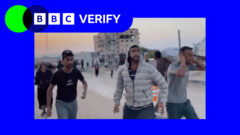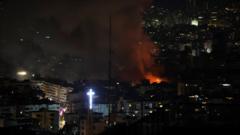Israeli officials are reportedly collaborating with Yasser Abu Shabab, leader of a Gaza militia, to challenge Hamas's influence in the area. Despite claims of receiving arms from Israel, Abu Shabab's group, the Popular Forces, denies such support and faces accusations of stealing humanitarian aid meant for struggling populations.
Inside the Complex Role of Yasser Abu Shabab in Gaza's Ongoing Conflict

Inside the Complex Role of Yasser Abu Shabab in Gaza's Ongoing Conflict
Yasser Abu Shabab, a Bedouin leader in southern Gaza, finds himself at the center of controversy as he navigates his militia's relationship with Israel and accusations of aid diversion.
Yasser Abu Shabab, a prominent Bedouin leader in his 30s, commands a Palestinian militia in southern Gaza known as the Popular Forces. This group has emerged in a contentious environment, particularly in eastern Rafah near a vital border crossing with Israel, where Israeli officials allege that they are arming his militia to weaken Hamas. While Mr. Abu Shabab maintains that his group has not received weapons from Israel, the role and activities of the Popular Forces have sparked significant debate.
Over recent months, international humanitarian organizations alongside local Palestinians have accused Abu Shabab of diverting resources from aid trucks intended for those facing hunger in Gaza. Amid these allegations, one pressing question persists: What motivates Israel to engage with a militia leader accused of such misconduct?
According to Prime Minister Benjamin Netanyahu, Israel's strategy includes activating clans in Gaza that oppose Hamas. He defends this approach, stating it is designed to safeguard the lives of Israeli Defense Forces. However, the utilization of Abu Shabab's militia raises further discussions concerning the future governance of Gaza, especially as his group is much smaller than the dominant Hamas faction.
Analysts believe Netanyahu's collaboration with Mr. Abu Shabab reflects a complex and ongoing evolution in Israel's strategy regarding Gaza's leadership. It underscores the intricate dynamics of the Israeli-Palestinian conflict, particularly the interplay between local factions and external influences as humanitarian crises continue to unfold.





















